|
|
|
Sort Order |
|
|
|
Items / Page
|
|
|
|
|
|
|
| Srl | Item |
| 1 |
ID:
082940


|
|
|
|
|
| Publication |
2008.
|
| Summary/Abstract |
The study critiques the development literature's neglect of the role played by institutions in development, with special emphasis on corruption cleanups. Such neglect is especially problematic in view of the fact that corruption is a major constraint to wealth creation and economic growth in Africa. The policy limitations of traditional development models with respect to corruption can be remedied by incorporating insights from the theory of public choice into the design and execution of new anti-corruption programs. Such insights include the introduction of new and more relevant rules, reform of existing laws and institutions, provision of more effective and relevant incentive structures, and enforcement mechanisms to reduce the profitability of opportunism
|
|
|
|
|
|
|
|
|
|
|
|
|
|
|
|
| 2 |
ID:
133767
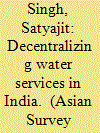

|
|
|
|
|
| Publication |
2014.
|
| Summary/Abstract |
This paper examines decentralized reform initiatives in the Indian rural water sector from a policy perspective as well as from a political perspective focused on institutional design and implementation at the local level. It argues that normative economic prescriptions regarding decentralization are not very useful. The paper finds that the institutional architecture for decentralized reforms is highly contested and requires a better understanding of power and the role of micro-politics in shaping decentralization designs and outcomes. It also suggests that greater devolution in the water sector can lead to greater decentralization and democratization across sectors.
|
|
|
|
|
|
|
|
|
|
|
|
|
|
|
|
| 3 |
ID:
120046
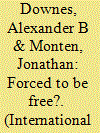

|
|
|
|
|
| Publication |
2013.
|
| Summary/Abstract |
Is military intervention effective in spreading democracy? Existing studies disagree. Optimists point to successful cases, such as the transformation of West Germany and Japan into consolidated democracies after World War II. Pessimists view these successes as outliers from a broader pattern of failure typified by cases such as Iraq and Afghanistan. Those in between agree that, in general, democratic military intervention has little liberalizing effect in target states, but contend that democracies can induce democratization when they explicitly pursue this objective and invest substantial effort and resources. Existing studies, however, often employ overly broad definitions of intervention, fail to grapple with possible selection effects in countries where democracies choose to intervene, and stress interveners' actions while neglecting conditions in targets. Astatistical examination of seventy instances of foreign-imposed regime change (FIRC) in the twentieth century shows that implementing prodemocratic institutional reforms, such as sponsoring elections, is not enough to induce democratization; interveners will meet with little success unless conditions in the target state-in the form of high levels of economic development and societal homogeneity, and previous experience with representative governance-are favorable to democracy. Given that prospective regime change operations are likely to target regimes in poor, diverse countries, policymakers should scale back their expectations that democracy will flourish after FIRC.
|
|
|
|
|
|
|
|
|
|
|
|
|
|
|
|
| 4 |
ID:
168802
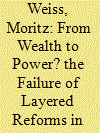

|
|
|
|
|
| Summary/Abstract |
This article puts forward a historical institutionalist explanation of how rising powers translate increased wealth into military strength. It develops microfoundations for path dependence and applies them empirically as an approach to defense procurement. The Indian government layered market reforms onto a state-run defense sector. It aimed to exploit competition in its massive acquisition of combat fighter aircraft after 2007. Yet, despite formal rule changes and overwhelming material benefits, government reformers ultimately failed and returned to an intergovernmental purchase in 2015. I develop two mechanisms to explain this instance of failed institutional change in India. First, the reform's structural misfit created uncertainty, as some of the prerequisites for a market such as sound legal protection and private actors were absent. Second, the government reformers were reluctantly supported at the outset by a coalition of so-called opportunists, which neither fully embraced nor strongly opposed institutional reforms. When problems resulting from the misfit multiplied and promised benefits vanished, however, this coalition dissolved and layering failed. A process-tracing analysis and the triangulation of a diverse set of data substantiate this explanation. The article contributes to debates on institutional change as well as to those on rising powers and the constraints they face in their attempts to transform growing wealth into military strength. Most significantly, it specifies a causal pathway along which state institutions shape the defense policies of rising powers. Layered reforms may fail not only when faced by defenders of the status quo; opportunists may suffice to defeat them.
|
|
|
|
|
|
|
|
|
|
|
|
|
|
|
|
| 5 |
ID:
164982
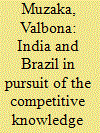

|
|
|
|
|
| Summary/Abstract |
The aim of this article is twofold: first, it seeks to address the question of why the competitive knowledge economy orientation that emerged in certain economically advanced states as a response to the crisis of Fordism came to be embraced by the Indian and the Brazilian states from the late 1980s onwards. Second, it aims to elucidate the manner in which the goal of becoming competitive knowledge economies has been articulated and implemented locally, especially from the mid-1990s onwards, by key fragments of the Indian and the Brazilian states. Drawing on insights from the competition state, regulation school, knowledge economy literature and that on India and Brazil, attention is paid to the context- and conjuncture-specific domestic and international factors that have contributed not only to the adoption of the competitive knowledge economy orientation, but also to the necessarily distinctive ways in which it found expression in practice in India and Brazil.
|
|
|
|
|
|
|
|
|
|
|
|
|
|
|
|
| 6 |
ID:
141762


|
|
|
|
|
| Summary/Abstract |
This article contributes to the debate in this journal about the state of British democracy. I criticise the tendency to use a ‘demand–supply’ dichotomy in interpreting the strong distrust experienced by institutions and politicians, and especially the idea that all the blame for current problems is to be attributed to the inadequateness of the British political tradition (BPT). By referring to international data on democracy and to recent British trends in both public attitudes and institutional innovations, a more nuanced picture on the state of democracy emerges. I argue that the BPT is not incompatible with incremental changes that have already introduced innovations in the way politics works in Britain today, and that the task of empowering citizens is one of the most delicate aspects in this process of innovation.
|
|
|
|
|
|
|
|
|
|
|
|
|
|
|
|
| 7 |
|
| 8 |
ID:
112448
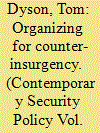

|
|
|
|
|
| Publication |
2012.
|
| Summary/Abstract |
Why do allies not adapt evenly even in time of war? This article maps and explains differentiation in the development of the stabilization and counter-insurgency doctrines of the British and Germanmilitaries during deployment in Afghanistan. In doing so the study analyses the neglected issue of the organizational capabilities of the British and German militaries to develop and apply military doctrine that is appropriate to the exigencies of the contemporary operational environment. Drawing upon documentary analysis and semi-structured interviews, this article uncovers new empirical material on the institutional reforms which have been undertaken to strengthen the adaptability of doctrine and its application in operations. It finds that while the British military's organizational capabilities were characterized by deficits at the tactical level between 2006 and 2009, recent years have seen significant improvement. In contrast, the organizational capabilities of the Germanmilitary remain stunted. While international structure is the main independent variable driving doctrinal adaptability, domestic variables exogenous to the military are the dominant intervening factor determining the development of effective organizational capabilities. Neoclassical realism provides the strongest analytical leverage in understanding the factors determining the capacity of militaries to adapt doctrine to the operational environment.
|
|
|
|
|
|
|
|
|
|
|
|
|
|
|
|
| 9 |
ID:
133947


|
|
|
|
|
| Publication |
2014.
|
| Summary/Abstract |
Municipal governments play a vital role in American democracy, as well as in governments around the world. Despite this, little is known about the degree to which cities are responsive to the views of their citizens. In the past, the unavailability of data on the policy preferences of citizens at the municipal level has limited scholars' ability to study the responsiveness of municipal government. We overcome this problem by using recent advances in opinion estimation to measure the mean policy conservatism in every U.S. city and town with a population above 20,000 people. Despite the supposition in the literature that municipal politics are non-ideological, we find that the policies enacted by cities across a range of policy areas correspond with the liberal-conservative positions of their citizens on national policy issues. In addition, we consider the influence of institutions, such as the presence of an elected mayor, the popular initiative, partisan elections, term limits, and at-large elections. Our results show that these institutions have little consistent impact on policy responsiveness in municipal government. These results demonstrate a robust role for citizen policy preferences in determining municipal policy outcomes, but cast doubt on the hypothesis that simple institutional reforms enhance responsiveness in municipal governments.
|
|
|
|
|
|
|
|
|
|
|
|
|
|
|
|
| 10 |
ID:
121055


|
|
|
|
|
| Publication |
2013.
|
| Summary/Abstract |
Pursuing the common good in a pluralist democracy is not possible without making compromises. Yet the spirit of compromise is in short supply in contemporary American politics. The permanent campaign has made compromise more difficult to achieve, as the uncompromising mindset suitable for campaigning has come to dominate the task of governing. To begin to make compromise more feasible and the common good more attainable, we need to appreciate the distinctive value of compromise and recognize the misconceptions that stand in its way. A common mistake is to assume that compromise requires finding the common ground on which all can agree. That undermines more realistic efforts to seek classic compromises, in which each party gains by sacrificing something valuable to the other, and together they serve the common good by improving upon the status quo. Institutional reforms are desirable, but they, too, cannot get off the ground without the support of leaders and citizens who learn how and when to adopt a compromising mindset.
|
|
|
|
|
|
|
|
|
|
|
|
|
|
|
|
|
|
|
|
|